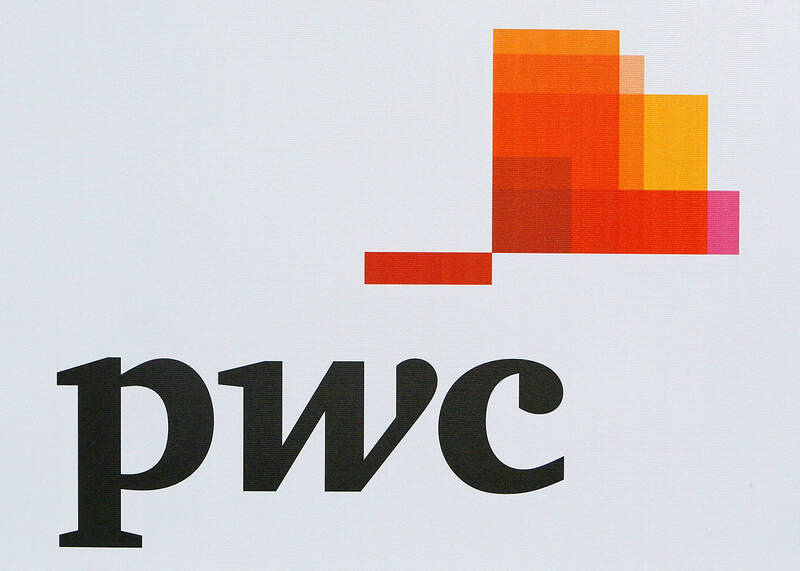A spike in the rate of major data breaches affecting companies has prompted excitement and skepticism about generative artificial intelligence (AI), PricewaterhouseCoopers (PwC) Taiwan said in a survey released yesterday.
Thirty-six percent of firms it surveyed were affected by data breaches last year that cost at least US$1 million apiece, up from 27 percent a year earlier, the survey showed.
While there is excitement about the development of cutting-edge AI security programs, progress on improving security has been sluggish, even stagnant, PwC Taiwan said, citing its survey, which polled 3,876 business and tech leaders in 71 countries.

Photo: Reuters
Healthcare was the industry most affected by cyberattacks, costing on average US$5.3 million to address the issue, 25 percent higher than the global average of US$4.4 million, PwC Taiwan said.
Forty-seven percent of healthcare organizations surveyed reported a data breach of at least US$1 million, it said.
As a company’s size increases, so does the cost of addressing breaches, it said.
Another surge in cyberthreats might be on the way, because generative AI can compromise e-mail systems at scale, it said.
However, it can also synthesize great volumes of data from an incident to help firms understand what has happened, it said.
The technology can describe complex threats in easy-to-understand language, recommend mitigation strategies and help with investigations, PwC Taiwan said.
With the rise of generative AI, respondents ranked digital threats as the top risks they are prioritizing for mitigation over the next 12 months, the survey found.
Cloud-related threats, attacks on connected devices and hack-and-leak operations were the top three cyber-related threats, it said.
However, more than 33 percent of companies have not instituted risk management efforts, while only 25 percent have upgraded their cyberresilience, it said.
Although cloud attacks are the top concern, about one-third of respondents had no risk management plan to address challenges with their cloud service providers, the survey showed.
Only half were “very satisfied” with their technology capabilities in key cybersecurity areas, while more than 30 percent did not consistently follow standard cyberdefense practices, it said.
Only 2 percent were optimizing and improving across all areas of cyberresilience, PwC Taiwan said.
As for cybertalent strategy, firms would seek to upskill their workforce, rebalance their in-house and outsourced services, and identify the right candidates for openings, it said.
Executives need to be agile to adapt to a changing market and challenge the “status quo” by building security into the fabric of their organization, rather than reacting after a crisis arises, PwC Taiwan added.

BYPASSING CHINA TARIFFS: In the first five months of this year, Foxconn sent US$4.4bn of iPhones to the US from India, compared with US$3.7bn in the whole of last year Nearly all the iPhones exported by Foxconn Technology Group (富士康科技集團) from India went to the US between March and last month, customs data showed, far above last year’s average of 50 percent and a clear sign of Apple Inc’s efforts to bypass high US tariffs imposed on China. The numbers, being reported by Reuters for the first time, show that Apple has realigned its India exports to almost exclusively serve the US market, when previously the devices were more widely distributed to nations including the Netherlands and the Czech Republic. During March to last month, Foxconn, known as Hon Hai Precision Industry

Taiwan Semiconductor Manufacturing Co (TSMC, 台積電) and the University of Tokyo (UTokyo) yesterday announced the launch of the TSMC-UTokyo Lab to promote advanced semiconductor research, education and talent development. The lab is TSMC’s first laboratory collaboration with a university outside Taiwan, the company said in a statement. The lab would leverage “the extensive knowledge, experience, and creativity” of both institutions, the company said. It is located in the Asano Section of UTokyo’s Hongo, Tokyo, campus and would be managed by UTokyo faculty, guided by directors from UTokyo and TSMC, the company said. TSMC began working with UTokyo in 2019, resulting in 21 research projects,

Taiwan’s property market is entering a freeze, with mortgage activity across the nation’s six largest cities plummeting in the first quarter, H&B Realty Co (住商不動產) said yesterday, citing mounting pressure on housing demand amid tighter lending rules and regulatory curbs. Mortgage applications in Taipei, New Taipei City, Taoyuan, Taichung, Tainan and Kaohsiung totaled 28,078 from January to March, a sharp 36.3 percent decline from 44,082 in the same period last year, the nation’s largest real-estate brokerage by franchise said, citing data from the Joint Credit Information Center (JCIC, 聯徵中心). “The simultaneous decline across all six cities reflects just how drastically the market

Ashton Hall’s morning routine involves dunking his head in iced Saratoga Spring Water. For the company that sells the bottled water — Hall’s brand of choice for drinking, brushing his teeth and submerging himself — that is fantastic news. “We’re so thankful to this incredible fitness influencer called Ashton Hall,” Saratoga owner Primo Brands Corp’s CEO Robbert Rietbroek said on an earnings call after Hall’s morning routine video went viral. “He really helped put our brand on the map.” Primo Brands, which was not affiliated with Hall when he made his video, is among the increasing number of companies benefiting from influencer